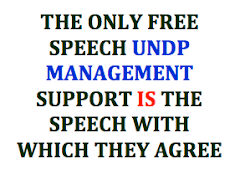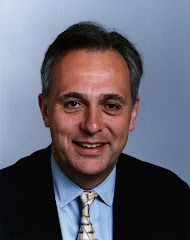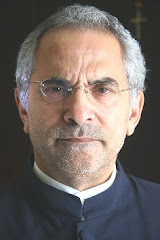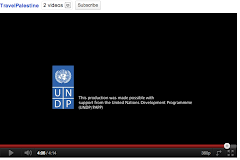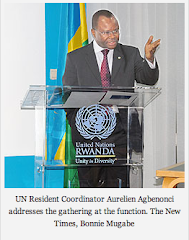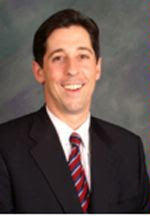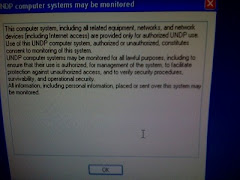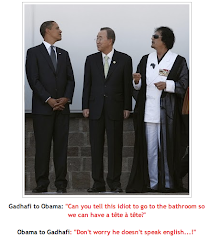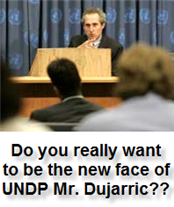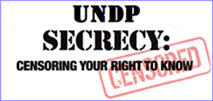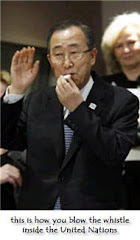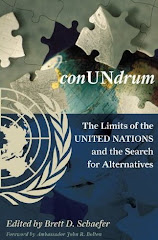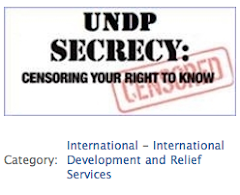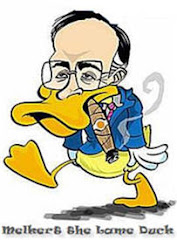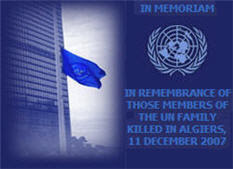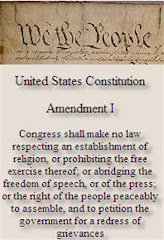Outsiders Have Access to U.N. Development Program's Financial Management System
Wednesday, July 11, 2007
By George Russell
ADVERTISEMENTThe United Nations Development Program, already mired in controversy for its dealings with North Korea, now faces another scandal involving the people who spend its $5.2 billion annual budget — and shut down its computerized financial management system yesterday when confronted by FOX News about their activities.
The new scandal involves UNDP’s headquarters financial unit, where checks are signed and purchase orders are approved for its sprawling operations world-wide.
Since the last week of June, FOX News has learned, investigators from the United Nations’ watchdog Office of Internal Oversight Services, or OIOS, have been probing the financial unit for evidence of hiring irregularities and violations of UNDP financial rules.
And already there are some themes similar to the six-month battle over UNDP operations in North Korea: evidence of unauthorized personnel working in sensitive positions that — according to its own regulations — should only be held by UNDP staff; payments with puzzling authorizations that total nearly $2 million; service providers whose employees may violate important UNDP rules and regulations.
FOX News has also learned from UNDP insiders that critical files may have disappeared out of reach of investigators.
This was coupled with dramatic, sudden, and secretive shut-downs of UNDP’s computers in the wake of FOX News email queries Tuesday about the situation.
Indeed, something like a covert scramble began within UNDP on Tuesday in the wake of the arrival of the FOX News questions.
At first, a UNDP press spokesman declared that there had been a delay in receiving the questions, directed to the top echelon of UNDP officials, due to a computer shutdown.
But by that time FOX News had already received telephone confirmation of receipt of the emails from the office of UNDP administrator Kemal Dervis, the organization’s CEO. Those emails included copies of the questions sent to the three top UNDP officials under Dervis.
Just two hours later, however, at 3:37 p.m. on Tuesday, UNDP employees told FOX News that there was a sudden shutdown of UNDP’s computerized financial management system —which coincided with an emergency senior staff meeting that took place in the 21st floor office of UNDP’s No. 2 official, Ad Melkert. (Melkert himself was traveling outside the country; the meeting was chaired by Melkert’s chief of staff, Tegegnework Gettu.)
FOX News was unable to learn what took place in the emergency meeting, or how long it lasted. But at 6:22 p.m., much — but not all — of UNDP’s computer systems came back on line.
With one significant exception. The portions of UNDP’s proprietary financial software system that deal with personnel assignments, personnel records, and access to financial tasks, remained blocked to almost everyone who normally uses those parts of the system, until at least 2 a.m.
The sudden cloak of secrecy was significant, because the new internal investigation centers precisely on the central financial bureau at the heart of UNDP where that financial software is used — a bureau that is directly under the supervision of the agency’s top-most officials.
It is known as the UNDP’s Office of Finance and Administration (OFA), which is headed by UNDP’s No. 4 official, Comptroller Darshak Shah, a 10-year UNDP veteran. OFA, with 84 employees, is responsible for managing the cash flow of the entire UNDP — an organization with more than 8,000 employees whose budget grew from $4 billion to $5 billion between 2000 and 2004, and is expected to grow by another 40% by 2015.
Whatever money UNDP has flows out of OFA to its operations in 190 countries world wide — and to a network of suppliers who provide everything from consultants to foodstuffs to train locomotives for development projects around the world.
Financial controls at OFA are supposedly tight — under UNDP rules, only full-time staff members are supposed to have access to the UNDP’s proprietary financial accounting and disbursement system, known as ATLAS. But that is the rule that is now being violated.
All of which deepens the drama now surrounding UNDP and its relationship with a job placement agency known as Professional Financial Temporaries, Inc.—or PRO-FIT, as it calls itself on its website, www.accountancyatprofit.com.
According to UNDP payment records obtained by FOX News, PRO-FIT has received more than $1.9 million in payments from UNDP since January 2005 alone. Those payments cover the salaries, benefits and other expenses — plus, of course, profit — for PRO-FIT for a variety of employees who are working at UNDP in the Office of Finance and Administration. Those employees’ salaries are not paid by UNDP, but by PRO-FIT itself, which also hires and fires the personnel.
The full number of PRO-FIT employees in the department is not known, though some UNDP insiders place it as high as 31 — or more than a third of the staff. Most are in lower-level clerical or accountancy jobs, but at least several perform functions such as financial disbursement which are supposedly performed only by regular U.N. staffers.
At least seven of the 31 outsiders have log-ins that allow them to operate within the agency’s ATLAS financial system as the equivalent of regular UNDP personnel, in violation of UNDP regulations.
FOX News has obtained ATLAS user IDs for the PRO-FIT employees that confirm their presence in the financial software system, and their roles, which include the ability to approve certain types of financial transactions and move financial deposits within the UNDP’s worldwide system. Along with the IDs, FOX News has obtained copies of PRO-FIT hourly time-sheets filled out by OFA workers and transmitted to PRO-FIT’s Manhattan fax number.
Moreover, FOX News has obtained OFA data recording scores of UNDP payments to PRO-FIT since January 2005. Significantly, none of the payments hit the threshold of $100,000 that is a benchmark for oversight by higher levels of UNDP management. But in a significant number of cases, the monthly totals for the payments easily exceed the $100,000 threshold. And the totals for 2005, 2006, and so far in 2007 all exceed that mark handily.
(Among the items paid there is a particularly unusual one: an invoice numbered 00040679, and dated April 26, 2006. It notes “placement fees” totaling $12,715 for an individual named Fatima Ba — a name almost identical to that of Administrator Dervis personal assistant, Fatimata Ba. Questioned by FOX News about her possible relationship with PRO-FIT, Fatimata Ba would only say that she “did not know” if such a relationship existed, and referred FOX News to the UNDP press office.)
PRO-FIT founder and president Alvin Galland declined to answer any questions from Fox News. (An associate who answered PRO-FIT’s telephone said that Galland “was about to go on vacation.”)
There is an even deeper mystery involving PRO-FIT — how it came to provide such sensitive, and possibly forbidden, services to UNDP that insiders say stretch back more than a decade, without any competitive rebidding of the contract for those services. (PRO-FIT itself, according to its website, was founded in 1996.)
Under UNDP regulations, all competitive contracts must be put up for rebidding every 36 months, but according to UNDP insiders, there are no records of the rebidding of the PRO-FIT contract within at least the past 48 months.
Moreover, insider sources have told FOX News that there is no sign at all of a PRO-FIT contract in UNDP’s legal files dating back for the past four years.
There is at least one piece of evidence that the PRO-FIT relationship stretches back beyond 2004. It’s date of registration in the ATLAS system is January 1, 1901; UNDP insiders explain that ATLAS was created in 2004 and any contracts preceding that time were given the same 1/1/1901 date.
Who authorized the deal with PRO-FIT, and who has been aware of it since that time?
Spending on the order of UNDP’s payments to PRO-FIT usually requires approval at the highest levels of the organization. For purchases of more than $100,000, only UNDP officials with the rank of Director and Assistant Secretary General and above are allowed to grant approval, with the required agreement of a special contract approval committee, known as the Advisory Committee on Procurement, or ACP.
Major purchases are also supposed to be open automatically for competitive bidding, with a rare number of exceptions.
There are at least some theoretical possibilities that the PRO-FIT contract escapes some of the regular UNDP rules. Some UNDP contracts, for example, are considered long-term, and exempt from the rebidding rule. But an examination by FOX News of records of the UNDP’s long term contracts, which are kept on the agency’s internal website, does not include the PRO-FIT deal among them. (FOX News obtained a duplicate image of the website at the time of examination in the event of subsequent tampering.)
UNDP financial rules also allow considerable authority to the organization’s Chief Procurement Officer to create contracts at his or her own discretion, without competitive bidding, so long as the reason is recorded in writing. But that discretion does not extend to granting outsiders access to the UNDP financial control system, ATLAS, which is expressly forbidden under UNDP rules.
UNDP’s Chief Procurement Officer is Akiko Yuge, the agency’s Deputy Assistant Administrator, and No. 3 official. FOX News queries to Yuge regarding the use of any discretionary authority in regard to PRO-FIT have so far gone unanswered.
Similar email questions were put by FOX News to Darshak Shah, head of OFA, along with questions about his awareness of outsiders having access to his office’s most sensitive financial record system. Shah acknowledged receipt of the questions, but said only that “UNDP will revert back to you soon.”
Additional questions sent to Ad Melkert and Kemal Dervis received no reply, beyond an advisory that Melkert was traveling until July 11.
But even without competitive bidding, UNDP purchases must observe safeguards. Any contract of $100,000 or more that is approved without bidding in a unit such as the Office of Financial Administration requires the specific approval of the Chief Procurement Officer — in this case, Deputy Associate Administrator Yuge — and it also requires review and endorsement by the Advisory Committee on Procurement, which Yuge chairs.
Questions to Yuge about whether the procurement committee was ever involved in reviewing PRO-FIT’s contract went unanswered.
The fact that outsiders have privileged access to UNDP’s sacrosanct financial software is not merely a breach of its most important financial rules. It raises the possibility that outsiders whose presence is known to UNDP’s senior management can enter, alter and delete data from the ATLAS record system — precisely the circumstance that the staffers-only access to ATLAS is intended to prevent.
That possibility is particularly sensitive at a time when UNDP has been locked in a bitter dispute with the U.S. government over the transfer of hard currency to the dictatorial government of Kim Jong Il, and, according to the U.S. mission to the United Nations transfers of sums totaling millions to North Korean entities that have a relationship to the country’s illicit nuclear weapons program.
Some of the U.S. accusations have been based on data obtained from the UNDP’s proprietary financial systems, samples of which were revealed to UNDP officials in closed door sessions. UNDP officials have in turn leaked stories claiming that the U.S. data samples differ from entries in those systems, with the clear implication that the U.S. information has been altered or otherwise falsified. The presence of outsiders with privileged and theoretically forbidden access to ATLAS, however, raises the possibility that UNDP itself could be altering data.
The sudden shutdown of UNDP computer access in the areas involving personnel records, duties and ATLAS access IDs further underlines that possibility.
If so, the issues surrounding UNDP may no longer involve just the violation of vital rules and procedures. In light of the investigations underway into the Office of Finance and Management, the issues may include obstruction of the United Nations’ own system of justice.
UPDATE
After publication of FOX News’ story, various U.N. officials have responded to some of the questions posed to them concerning OFA and PRO-FIT. Among other things, the officials state that OFA currently has 117 employees, of whom 101 are staff and 16 contracted workers. Of the 16, 10 are said to be employees of PRO-FIT, while "the other six come from three other external companies."
According to U.N. Chief Procurement Officer Akiko Yuge, the contract for PRO-FIT was approved after a "competitive bidding process" in 1998. The contract was approved under an arrangement known as a Reimbursable Loan Agreement, which allows UNDP to pay outside companies for the services of temporary employees, and does not, Yuge says, require further competitive bidding. "UNDP believes that to date it has received value for money from PRO-FIT," she added.
Even so, Yuge said, OFA has already changed its ways. After deciding "some time ago" to undertake a "new competitive process" for the kind of services PRO-FIT offers, she said, "the bidding process took place three months ago and is currently under review."
FOX News has examined the UNDP procurement Web site where competitive bidding exercises are announced and posted. There is no record on the site of any posting for the services offered by PRO-FIT during the time period Yuge mentions.
Yuge’s claim about the date of UNDP’s relationship with PRO-FIT is contradicted to some degree by answers provided to FOX News by OFA head Darshak Shah. He declared that "PRO-FIT has provided services to UNDP since the mid 1990s." He did agree with Yuge that the deal was finalized under a Reimbursable Loan Agreement, or RLA, "under the authority delegated in accordance with UNDP financial regulations and rules."
FOX News has obtained a copy of the UNDP circular that initially announced the introduction of RLAs. Issued by the UNDP Office of Human Resources, it is dated July 27, 1999 — long after both officials say it was used in the case of PRO-FIT.
Both UNDP officials claim that outside employees at OFA — including those from PRO-FIT — are not forbidden access to the ATLAS financial management system, but are restricted only to data-entry functions.
"PRO-FIT employees in OFA have not been delegated certification and approval functions in ATLAS," Shah asserted.
But UNDP guidelines for hiring short-term help and contractors, which FOX News has examined, explicitly cite ATLAS "access" as a form of "approving or signing authority" that must not be granted to the employee. The same guidelines cover employees under RLAs.
Moreover, UNDP documents, computer log-ins and other information in FOX News’ possession confirm that PRO-FIT employees perform financial approval and other tasks that are supposedly done only by UNDP staffers, as previously reported.
Alvin Galland, the president of PRO-FIT, who initially declined to speak to FOX News, also responded by telephone after the originally story was published. According to Galland, his firm has had a "relationship with UNDP for 13 or 14 years," which would date it to the early 1990s. "We do have contracts, they were competitive, and they were bid," he declared. "I have had nothing but fully professional relations with UNDP."
Galland declined, however, to discuss any specific details of his relationship of his contractual relations with UNDP, suggesting that any such information should come from the international agency.
George Russell is Executive Editor of FOX News.
Thursday, July 12, 2007
Saturday, July 7, 2007
Second Probe of UNDP-North Korea Scandal Set to Begin
Second Probe of UNDP-North Korea Scandal Set to Begin
Saturday , July 07, 2007
By George Russell
FOXNEWS
ADVERTISEMENT
The next round in the investigation of the United Nations Development Program’s scandal-tainted operations in North Korea is about to begin.
The question is whether it will be any more successful than the original probe in getting a clear picture of a UNDP program that the U.S. government, among others, charges was hijacked by the communist government of Kim Jong Il and funneled millions in UNDP hard currency into North Korea’s nuclear weapons program.
Another big question is how much, if any, of the UNDP’s documentation will be turned over to the auditors this time for inspection. The bulk of that documentation is still in U.N. safekeeping in Pyongyang — where the previous group of auditors was barred by Kim’s government.
The bell for Round 2 was quietly sounded nearly two weeks ago, in a June 29 letter from the United Nations’ board of external auditors to a U.N. General Assembly committee that examines budget issues. A copy of the letter has been obtained by FOX News.
The letter announces that the auditors, at the urging of U.N. Secretary General Ban Ki-Moon, will make a second attempt to probe the depths of the UNDP’s operations in North Korea, which were suspended in February after the Kim regime refused to accept a variety of new restrictions sparked by the U.S. accusations. When the new auditing effort will begin is not specified.
The North Korean government refused to cooperate in the first U.N. audit, which was published on May 31, and which corroborated many of the U.S. accusations, based in turn on confidential UNDP inspections done in previous years.
According to the Round 1 auditors, UNDP made unauthorized hard currency payments to the North Korean government, not only for its own work in North Korea but for a variety of other U.N. agencies — at least $72 million from 2002 to 2006.
UNDP had hired 22 of its 31 staffers locally, in some cases in oversight roles. The local employees were not only nominated by Kim’s dictatorship, but remained North Korean government employees. The auditors also declared that many inspections of UNDP development projects in North Korea were only carried out under North Korean escort and in some cases by the same local North Korean employees.
Despite all that, UNDP officials declared the initial audit an exoneration, leading to declarations of “dismay” by U.S. diplomats.
Since then, the issue has further morphed into a point of visible tension between the U.S. mission to the U.N. and top UNDP officials, especially the multibillion-dollar agency’s No. 2 man, Associate Administrator Ad Melkert, who allegedly threatened “retaliation” against the U.S. in closed-door meetings over the North Korea affair. Melkert and UNDP have strongly denied the allegation.
For their part, U.S. officials raised the stakes further by documenting additional UNDP fund diversions, in some cases to known North Korean weapons developers, from their own sources. UNDP has in turn rejected the U.S. allegations as based on false evidence and challenged U.S. diplomats to come up with more and better documentation.
All told, the confrontation has marked an extraordinary watershed in relations between the $5 billion U.N. flagship development agency and its largest single financial supporter. The U.S. contributes roughly $100 million to the UNDP budget and is a member of its overseeing 36-nation Executive Board.
The question is whether a further audit will clear the air — or add to the fog.
The auditors themselves do not appear to be entirely sure.
In the letter to the U.N. budget committee, the head of the U.N. auditing board, Philippe Seguin, gingerly declares that a second probe “will provide additional evidence” to back the conclusions of the initial report.
But the auditors backed away from recommendations in the earlier document that urged the U.N. seek “accountability” for the lapses outlined in its first report and attempt to trace where UNDP money might have migrated in North Korea once it left the agency’s hands.
Nor will the new probe attempt to clarify another explosive issue: the discovery of at least $3,500 in counterfeit U.S. money that had apparently been stowed for years in a UNDP safe in Pyongyang. Such efforts would be “investigative,” Seguin says, and thus outside the auditors’ mandate.
Finally, the new probe will depend once again on the whims of North Korea’s rulers on whether the inspectors will get to visit Pyongyang at all. Seguin’s letter makes clear that the auditors require “unrestricted access” to UNDP and other U.N. operations in North Korea, as well as visas, housing, and “agreement on access to all project sites.” All were refused for the first audit.
If that permission is not granted, UNDP officials have promised that they will bring their documents, both paper and electronic, out of North Korea for inspection — something the U.S. has demanded since before the initial audit took place.
But that in turn could raise questions about whether any of the records were erased or suppressed in the months since the controversy surfaced—or even if they all have then made the trip back from Pyongyang.
All such sparring, however, lies far ahead — provided that the U.N.’s promise to keep probing continues to be honored.
George Russell is executive editor of FOX News.
Saturday , July 07, 2007
By George Russell
FOXNEWS
ADVERTISEMENT
The next round in the investigation of the United Nations Development Program’s scandal-tainted operations in North Korea is about to begin.
The question is whether it will be any more successful than the original probe in getting a clear picture of a UNDP program that the U.S. government, among others, charges was hijacked by the communist government of Kim Jong Il and funneled millions in UNDP hard currency into North Korea’s nuclear weapons program.
Another big question is how much, if any, of the UNDP’s documentation will be turned over to the auditors this time for inspection. The bulk of that documentation is still in U.N. safekeeping in Pyongyang — where the previous group of auditors was barred by Kim’s government.
The bell for Round 2 was quietly sounded nearly two weeks ago, in a June 29 letter from the United Nations’ board of external auditors to a U.N. General Assembly committee that examines budget issues. A copy of the letter has been obtained by FOX News.
The letter announces that the auditors, at the urging of U.N. Secretary General Ban Ki-Moon, will make a second attempt to probe the depths of the UNDP’s operations in North Korea, which were suspended in February after the Kim regime refused to accept a variety of new restrictions sparked by the U.S. accusations. When the new auditing effort will begin is not specified.
The North Korean government refused to cooperate in the first U.N. audit, which was published on May 31, and which corroborated many of the U.S. accusations, based in turn on confidential UNDP inspections done in previous years.
According to the Round 1 auditors, UNDP made unauthorized hard currency payments to the North Korean government, not only for its own work in North Korea but for a variety of other U.N. agencies — at least $72 million from 2002 to 2006.
UNDP had hired 22 of its 31 staffers locally, in some cases in oversight roles. The local employees were not only nominated by Kim’s dictatorship, but remained North Korean government employees. The auditors also declared that many inspections of UNDP development projects in North Korea were only carried out under North Korean escort and in some cases by the same local North Korean employees.
Despite all that, UNDP officials declared the initial audit an exoneration, leading to declarations of “dismay” by U.S. diplomats.
Since then, the issue has further morphed into a point of visible tension between the U.S. mission to the U.N. and top UNDP officials, especially the multibillion-dollar agency’s No. 2 man, Associate Administrator Ad Melkert, who allegedly threatened “retaliation” against the U.S. in closed-door meetings over the North Korea affair. Melkert and UNDP have strongly denied the allegation.
For their part, U.S. officials raised the stakes further by documenting additional UNDP fund diversions, in some cases to known North Korean weapons developers, from their own sources. UNDP has in turn rejected the U.S. allegations as based on false evidence and challenged U.S. diplomats to come up with more and better documentation.
All told, the confrontation has marked an extraordinary watershed in relations between the $5 billion U.N. flagship development agency and its largest single financial supporter. The U.S. contributes roughly $100 million to the UNDP budget and is a member of its overseeing 36-nation Executive Board.
The question is whether a further audit will clear the air — or add to the fog.
The auditors themselves do not appear to be entirely sure.
In the letter to the U.N. budget committee, the head of the U.N. auditing board, Philippe Seguin, gingerly declares that a second probe “will provide additional evidence” to back the conclusions of the initial report.
But the auditors backed away from recommendations in the earlier document that urged the U.N. seek “accountability” for the lapses outlined in its first report and attempt to trace where UNDP money might have migrated in North Korea once it left the agency’s hands.
Nor will the new probe attempt to clarify another explosive issue: the discovery of at least $3,500 in counterfeit U.S. money that had apparently been stowed for years in a UNDP safe in Pyongyang. Such efforts would be “investigative,” Seguin says, and thus outside the auditors’ mandate.
Finally, the new probe will depend once again on the whims of North Korea’s rulers on whether the inspectors will get to visit Pyongyang at all. Seguin’s letter makes clear that the auditors require “unrestricted access” to UNDP and other U.N. operations in North Korea, as well as visas, housing, and “agreement on access to all project sites.” All were refused for the first audit.
If that permission is not granted, UNDP officials have promised that they will bring their documents, both paper and electronic, out of North Korea for inspection — something the U.S. has demanded since before the initial audit took place.
But that in turn could raise questions about whether any of the records were erased or suppressed in the months since the controversy surfaced—or even if they all have then made the trip back from Pyongyang.
All such sparring, however, lies far ahead — provided that the U.N.’s promise to keep probing continues to be honored.
George Russell is executive editor of FOX News.
Labels:
ad melkert,
for food,
kemal dervis,
oil,
scandal,
undp,
United Nations,
whistleblower
Ex-Worker Seeks Whistleblower Protection
Ex-Worker Seeks Whistleblower Protection
By EDITH M. LEDERER
The Associated Press
Saturday, July 7, 2007; 3:22 AM
UNITED NATIONS -- The former operations officer for the U.N. anti-poverty agency in North Korea is seeking whistleblower protection from the United Nations, saying he lost his job for raising serious allegations about its financial transactions in the reclusive communist nation.
The U.N. Development Fund on Friday, however, disputed Artjon Shkurtaj's allegations that he was subject to retaliation.
In an interview with The Associated Press, Shkurtaj said he went to the former U.N. management chief and the U.S. government after his bosses at the U.N. Development Fund failed to act on his allegations.
When he asked what to do with counterfeit U.S. dollars he found in the office safe on his first day in Pyongyang in November 2004, Shkurtaj said he never got a response. And he said when he complained that paying all North Korean salaries and program expenses in hard currency instead of local currency was against U.N. rules, he said he was told "not to rock the boat."
UNDP spokesman David Morrison said Friday that the agency "has looked into this claim and based on available information found it to be without basis."
"UNDP has invited the individual to submit all relevant information to the UNDP office charged with undertaking internal inquiries, but he has so far declined to do so," Morrison told a news conference.
Two U.S. lawmakers _ Sen. Norm Coleman, a Minnesota Republican, and Rep. Ileana Ros-Lehtinen, a Florida Republican, have sent letters to Secretary-General Ban Ki-moon urging him to intervene and ensure that Shkurtaj is not punished for raising concerns about U.N. operations in North Korea.
U.N. deputy spokeswoman Marie Okabe said the U.N. Ethics Office was considering a request by the former UNDP employee seeking whistleblower protection.
The whistleblower issue comes on the heels of U.S. allegations that UNDP had funneled millions of dollars in hard currency to North Korea with little assurance that Kim Jong Il used the money to help his people instead of diverting it to "illicit purposes," including developing nuclear weapons.
Shkurtaj, who is Albanian, said after he went to the U.S. government in July 2006, U.S. officials asked UNDP two questions: Was there counterfeit money in the safe in Pyongyang and was UNDP operating in hard currency?
In late March, UNDP announced that U.N. and U.S. authorities were investigating how $3,500 in suspected counterfeit $100 bills ended up sitting in a safe in the UNDP office in North Korea for 12 years.
An initial U.N. audit ordered by the secretary-general in response to the U.S. allegations reported in June that U.N. agencies paid North Korean staff and suppliers in hard currency _ euros _ without approval and hired only government-approved staff in violation of U.N. procedures.
After the U.S. raised new allegations, Ban said he would ask U.N. budget officials to approve a further probe by the auditors, who were unable to visit Pyongyang.
Morrison said the former UNDP worker _ whom he did not name _ was interviewed by the external auditors and met with UNDP Administrator Kemal Dervis.
"A lot of what he says, frankly, we're not going to be able to settle on until auditors or independent authorities have access to the documentation which remains in Pyongyang," Morrison said.
He said if the audit doesn't continue, UNDP will bring the records out of Pyongyang "to settle these questions once and for all."
Shkurtaj said the UNDP records from Pyongyang should be brought back and opened to anyone to examine to see where every penny was spent _ and he said they should have been returned months ago.
Morrison said the former UNDP employee was not "a 13-year veteran" as Ros-Lehtinen claimed, but worked on short-term contracts for UNDP dating back to the 1990s, including in North Korea in 2005-2006. He said the whistleblower's latest three-month consultancy expired in March 2007.
Shkurtaj countered that he was ordered to return to New York on Sept. 26, 2006, in the middle of his contract, because "I rocked the boat too much and it was better for my health and future career."
But after continuing to pursue answers to the questions he raised in Pyongyang, he said, UNDP officials told him in March that there were no further jobs for him.
"My case is very important," Shkurtaj said. "If my case fails, everybody else in the U.N. will get the message, don't talk to the U.S. or any other member state if you want to keep your job."
By EDITH M. LEDERER
The Associated Press
Saturday, July 7, 2007; 3:22 AM
UNITED NATIONS -- The former operations officer for the U.N. anti-poverty agency in North Korea is seeking whistleblower protection from the United Nations, saying he lost his job for raising serious allegations about its financial transactions in the reclusive communist nation.
The U.N. Development Fund on Friday, however, disputed Artjon Shkurtaj's allegations that he was subject to retaliation.
In an interview with The Associated Press, Shkurtaj said he went to the former U.N. management chief and the U.S. government after his bosses at the U.N. Development Fund failed to act on his allegations.
When he asked what to do with counterfeit U.S. dollars he found in the office safe on his first day in Pyongyang in November 2004, Shkurtaj said he never got a response. And he said when he complained that paying all North Korean salaries and program expenses in hard currency instead of local currency was against U.N. rules, he said he was told "not to rock the boat."
UNDP spokesman David Morrison said Friday that the agency "has looked into this claim and based on available information found it to be without basis."
"UNDP has invited the individual to submit all relevant information to the UNDP office charged with undertaking internal inquiries, but he has so far declined to do so," Morrison told a news conference.
Two U.S. lawmakers _ Sen. Norm Coleman, a Minnesota Republican, and Rep. Ileana Ros-Lehtinen, a Florida Republican, have sent letters to Secretary-General Ban Ki-moon urging him to intervene and ensure that Shkurtaj is not punished for raising concerns about U.N. operations in North Korea.
U.N. deputy spokeswoman Marie Okabe said the U.N. Ethics Office was considering a request by the former UNDP employee seeking whistleblower protection.
The whistleblower issue comes on the heels of U.S. allegations that UNDP had funneled millions of dollars in hard currency to North Korea with little assurance that Kim Jong Il used the money to help his people instead of diverting it to "illicit purposes," including developing nuclear weapons.
Shkurtaj, who is Albanian, said after he went to the U.S. government in July 2006, U.S. officials asked UNDP two questions: Was there counterfeit money in the safe in Pyongyang and was UNDP operating in hard currency?
In late March, UNDP announced that U.N. and U.S. authorities were investigating how $3,500 in suspected counterfeit $100 bills ended up sitting in a safe in the UNDP office in North Korea for 12 years.
An initial U.N. audit ordered by the secretary-general in response to the U.S. allegations reported in June that U.N. agencies paid North Korean staff and suppliers in hard currency _ euros _ without approval and hired only government-approved staff in violation of U.N. procedures.
After the U.S. raised new allegations, Ban said he would ask U.N. budget officials to approve a further probe by the auditors, who were unable to visit Pyongyang.
Morrison said the former UNDP worker _ whom he did not name _ was interviewed by the external auditors and met with UNDP Administrator Kemal Dervis.
"A lot of what he says, frankly, we're not going to be able to settle on until auditors or independent authorities have access to the documentation which remains in Pyongyang," Morrison said.
He said if the audit doesn't continue, UNDP will bring the records out of Pyongyang "to settle these questions once and for all."
Shkurtaj said the UNDP records from Pyongyang should be brought back and opened to anyone to examine to see where every penny was spent _ and he said they should have been returned months ago.
Morrison said the former UNDP employee was not "a 13-year veteran" as Ros-Lehtinen claimed, but worked on short-term contracts for UNDP dating back to the 1990s, including in North Korea in 2005-2006. He said the whistleblower's latest three-month consultancy expired in March 2007.
Shkurtaj countered that he was ordered to return to New York on Sept. 26, 2006, in the middle of his contract, because "I rocked the boat too much and it was better for my health and future career."
But after continuing to pursue answers to the questions he raised in Pyongyang, he said, UNDP officials told him in March that there were no further jobs for him.
"My case is very important," Shkurtaj said. "If my case fails, everybody else in the U.N. will get the message, don't talk to the U.S. or any other member state if you want to keep your job."
Labels:
ad melkert,
for food,
kemal dervis,
oil,
undp,
United Nations,
whistleblower
In Ban's UN, Whistleblower Attacked by UNDP, Placed Among the Crazies
In Ban's UN, Whistleblower Attacked by UNDP, Placed Among the Crazies
Byline: Matthew Russell Lee of Inner City Press at the UN: News Analysis
UNITED NATIONS, July 6 -- In an effort to cut short or divert from the slow but ongoing investigation of the UN Development Program, UNDP's spokesman David Morrison on Friday appeared at Ban Ki-moon's spokesperson's noon press briefing in order to dismiss its former chief of operation and security in North Korea, who has charged UNDP with wrongdoing, as a mere short-time consultant, and to deny it has retaliated against him.
But in response to questions from Inner City Press, Mr. Morrison acknowledged that it was UNDP who told security guards in not only its headquarters building but also in the UN's landmark glass-faced building not to allow in the whistleblower, who was named for the first time last Friday, in the New York Times: Tony Shkurtaj.
Morrison said that because Shkurtaj's "short term" contract expired in March, but his pass to enter the UN extended to July 1, UNDP informed UN Security to add Shkurtaj's photo to the array of individuals, including alleged terrorists and "crazies," not to be let into the UN. Video here, from Minute 23:44 to 27:15.
UNDP's authority to block access to the Secretariat building is unclear, as is the veracity or repercussions of the alleged contract - grounds pass discrepancy. Asked by Inner City Press if UNDP has ever before made such a notification, Morrison said he didn't know. Eight hours later, no other examples had been provided.
In an attempt to claim that Shkurtaj's warnings, about the use of hard currency, counterfeit and domination by Kim Jong-il's government, were listened to, Morrison stated that earlier this year, Shkurtaj met with UNDP Administrator Kemal Dervis. But the retaliation followed, and even intensified after that meeting.
Mr. Ban and Mr. Dervis, July 5, 2007, whistleblower not shown
While Morrison tried to say that Shkurtaj refused to cooperate with UNDP's own investigation, Inner City Press has seen a June 5 e-mail in which UNDP's auditor Antoine Khoury informed Shkurtaj, "we cannot accept to have a representative from the Staff Council present at this meeting" with you. It should be noted that the Board of Auditors allowed UNDP Staff Council to be present during their interview with Shkurtaj.
As it turns out, Khoury was responsible for the audits of UNDP in North Korea in 2001 and 2004, which failed to disclose among other things the counterfeit currency in UNDP's safe, and payments in hard currency in UNDP's program.
The Staff Council wrote, in a June 15, 2007, letter, that "we do not believe it is appropriate to characterize you as a short term consultant, while your responsibilities included managing the operations of the DPRK office including the authorization of disbursement of funds on behalf of UNDP and other agencies -- being core functions performed by core staff."
[The wider Staff Union's talk with Mr. Ban on whistleblower's' topics will be covered by Inner City Press immanently.]
Also contrary to Morrison's characterization of Shkurtaj as a "short term consultant" is a message that Shkurtaj sent on Friday morning to Morrison and other UNDP representatives, including Associate Administrator Ad Melkert and Asia and Pacific operations official David Lockwood, that
"My index number is [ ]. Run it thru ATLAS HR and IMIS, and you will find that I was not a 'Short-Term Consultant.' UNDP still owns me the Pension Contributions for 2006. Check your internal documents in Comptrollers/Treasurer office and you will see that the following statement still standing in UNDP’s website is a slander attempt and yet another retaliation. Be professional and don't become ridiculous on these statements otherwise if I was a 'short term consultant' awarded all the authorities that I had and all checks I signed and the diplomas paid by UNDP during the assignment, some of you have to resign immediately for allowing that to happen."
At Friday's press conference, Inner City Press asked Morrison about several other recent demotions within UNDP, including of the head of budgets, Jocelline Bazile-Finley. When Inner City Press asked Kemal Dervis about this demotion, Dervis replied, "I am not going to answer any of your questions." Morrison on Friday said that people change jobs all the time, and said he had no awareness of the UNDP's hiring of any new information technology contractor.
Rather than answer Inner City Press' direct question of whether he denies that UNDP legal officers James Provenzano and Peri Johnson told Shkurtaj that he would have to leave the country, Morrison said he had already answered this question. But what was the answer? UNDP has refused to answer Inner City Press written questions for months, including for example a June 18 question, referred by Ban Ki-moon's Spokesperson's Office of whether UNDP has funded the police or security forces of the Transitional Federal Government of Somalia.
Asked for an update on the previously discussed controversy surround UNDP's support for a diamond mine in Zimbabwe -- the allegation is that UNDP was involved in diamond smuggling -- Morrison Friday provided no update. He said he could not provide any update on Ad Melkert's (and Kemal Dervis') previously claims that UNDP would begin making copies of audits available to member states, at least those on UNDP's Executive Board. We've been busy with DPR Korea, Morrison said.
But on this, when Inner City Press asked Morrison about reports that UNDPs' David Lockwood told Shkurtaj that if he kept quiet, another UNDP job could be arranged, Morrison replied that he had just "run into David Lockwood," who said that he had never spoken with or laid eyes on Shkurtaj until December 2006. But in Shkurtaj's job, as verified by the UNDP Staff Council, Lockwood was Shkurtaj's direct supervisor, and, according to Shkurtaj, signed his appointment.
While Ban Ki-moon's spokesperson Michele Montas, when asked by Inner City Press for Mr. Ban's views on UNDP's actions, said that Mr. Ban has discussed this with senior advisors and is taking care of it, what this means remains unclear. Meanwhile, UNDP's actions send the message to others in the agency, do not speak, or face the photo array and more.
Inner City Press asked Morrison if he denies Shkurtaj's statement, made to the UN Ethics Office, that "on 19 January 2007 -- the same day as the Secretary-General ordered an inquiry into allegations of wrongdoing by UNDP in North Korea, UNDP Associate Administrator Ad Melkert informed a colleague that he suspected that I may have shared information [and] ordered that my access to ATLAS be terminated, and that my contract be allowed to expire as of the end of March 2007."
After some equivocation, Morrison denied this. Video here, from Minute 35:08, for the record, on camera. We'll continue on this.
Again, because a number of Inner City Press' UN sources go out of their way to express commitment to serving the poor, and while it should be unnecessary, Inner City Press is compelled to conclude this installment in a necessarily-ongoing series by saluting the stated goals of the UN agencies and many of their staff. Keep those cards, letters and emails coming, and phone calls too, we apologize for any phone tag, but please continue trying, and keep the information flowing.
Feedback: Editorial [at] innercitypress.com
UN Office: S-453A, UN, NY 10017 USA Tel: 212-963-1439
Reporter's mobile (and weekends): 718-716-3540 Matthew.Lee [at] innercitypress.com
Byline: Matthew Russell Lee of Inner City Press at the UN: News Analysis
UNITED NATIONS, July 6 -- In an effort to cut short or divert from the slow but ongoing investigation of the UN Development Program, UNDP's spokesman David Morrison on Friday appeared at Ban Ki-moon's spokesperson's noon press briefing in order to dismiss its former chief of operation and security in North Korea, who has charged UNDP with wrongdoing, as a mere short-time consultant, and to deny it has retaliated against him.
But in response to questions from Inner City Press, Mr. Morrison acknowledged that it was UNDP who told security guards in not only its headquarters building but also in the UN's landmark glass-faced building not to allow in the whistleblower, who was named for the first time last Friday, in the New York Times: Tony Shkurtaj.
Morrison said that because Shkurtaj's "short term" contract expired in March, but his pass to enter the UN extended to July 1, UNDP informed UN Security to add Shkurtaj's photo to the array of individuals, including alleged terrorists and "crazies," not to be let into the UN. Video here, from Minute 23:44 to 27:15.
UNDP's authority to block access to the Secretariat building is unclear, as is the veracity or repercussions of the alleged contract - grounds pass discrepancy. Asked by Inner City Press if UNDP has ever before made such a notification, Morrison said he didn't know. Eight hours later, no other examples had been provided.
In an attempt to claim that Shkurtaj's warnings, about the use of hard currency, counterfeit and domination by Kim Jong-il's government, were listened to, Morrison stated that earlier this year, Shkurtaj met with UNDP Administrator Kemal Dervis. But the retaliation followed, and even intensified after that meeting.
Mr. Ban and Mr. Dervis, July 5, 2007, whistleblower not shown
While Morrison tried to say that Shkurtaj refused to cooperate with UNDP's own investigation, Inner City Press has seen a June 5 e-mail in which UNDP's auditor Antoine Khoury informed Shkurtaj, "we cannot accept to have a representative from the Staff Council present at this meeting" with you. It should be noted that the Board of Auditors allowed UNDP Staff Council to be present during their interview with Shkurtaj.
As it turns out, Khoury was responsible for the audits of UNDP in North Korea in 2001 and 2004, which failed to disclose among other things the counterfeit currency in UNDP's safe, and payments in hard currency in UNDP's program.
The Staff Council wrote, in a June 15, 2007, letter, that "we do not believe it is appropriate to characterize you as a short term consultant, while your responsibilities included managing the operations of the DPRK office including the authorization of disbursement of funds on behalf of UNDP and other agencies -- being core functions performed by core staff."
[The wider Staff Union's talk with Mr. Ban on whistleblower's' topics will be covered by Inner City Press immanently.]
Also contrary to Morrison's characterization of Shkurtaj as a "short term consultant" is a message that Shkurtaj sent on Friday morning to Morrison and other UNDP representatives, including Associate Administrator Ad Melkert and Asia and Pacific operations official David Lockwood, that
"My index number is [ ]. Run it thru ATLAS HR and IMIS, and you will find that I was not a 'Short-Term Consultant.' UNDP still owns me the Pension Contributions for 2006. Check your internal documents in Comptrollers/Treasurer office and you will see that the following statement still standing in UNDP’s website is a slander attempt and yet another retaliation. Be professional and don't become ridiculous on these statements otherwise if I was a 'short term consultant' awarded all the authorities that I had and all checks I signed and the diplomas paid by UNDP during the assignment, some of you have to resign immediately for allowing that to happen."
At Friday's press conference, Inner City Press asked Morrison about several other recent demotions within UNDP, including of the head of budgets, Jocelline Bazile-Finley. When Inner City Press asked Kemal Dervis about this demotion, Dervis replied, "I am not going to answer any of your questions." Morrison on Friday said that people change jobs all the time, and said he had no awareness of the UNDP's hiring of any new information technology contractor.
Rather than answer Inner City Press' direct question of whether he denies that UNDP legal officers James Provenzano and Peri Johnson told Shkurtaj that he would have to leave the country, Morrison said he had already answered this question. But what was the answer? UNDP has refused to answer Inner City Press written questions for months, including for example a June 18 question, referred by Ban Ki-moon's Spokesperson's Office of whether UNDP has funded the police or security forces of the Transitional Federal Government of Somalia.
Asked for an update on the previously discussed controversy surround UNDP's support for a diamond mine in Zimbabwe -- the allegation is that UNDP was involved in diamond smuggling -- Morrison Friday provided no update. He said he could not provide any update on Ad Melkert's (and Kemal Dervis') previously claims that UNDP would begin making copies of audits available to member states, at least those on UNDP's Executive Board. We've been busy with DPR Korea, Morrison said.
But on this, when Inner City Press asked Morrison about reports that UNDPs' David Lockwood told Shkurtaj that if he kept quiet, another UNDP job could be arranged, Morrison replied that he had just "run into David Lockwood," who said that he had never spoken with or laid eyes on Shkurtaj until December 2006. But in Shkurtaj's job, as verified by the UNDP Staff Council, Lockwood was Shkurtaj's direct supervisor, and, according to Shkurtaj, signed his appointment.
While Ban Ki-moon's spokesperson Michele Montas, when asked by Inner City Press for Mr. Ban's views on UNDP's actions, said that Mr. Ban has discussed this with senior advisors and is taking care of it, what this means remains unclear. Meanwhile, UNDP's actions send the message to others in the agency, do not speak, or face the photo array and more.
Inner City Press asked Morrison if he denies Shkurtaj's statement, made to the UN Ethics Office, that "on 19 January 2007 -- the same day as the Secretary-General ordered an inquiry into allegations of wrongdoing by UNDP in North Korea, UNDP Associate Administrator Ad Melkert informed a colleague that he suspected that I may have shared information [and] ordered that my access to ATLAS be terminated, and that my contract be allowed to expire as of the end of March 2007."
After some equivocation, Morrison denied this. Video here, from Minute 35:08, for the record, on camera. We'll continue on this.
Again, because a number of Inner City Press' UN sources go out of their way to express commitment to serving the poor, and while it should be unnecessary, Inner City Press is compelled to conclude this installment in a necessarily-ongoing series by saluting the stated goals of the UN agencies and many of their staff. Keep those cards, letters and emails coming, and phone calls too, we apologize for any phone tag, but please continue trying, and keep the information flowing.
Feedback: Editorial [at] innercitypress.com
UN Office: S-453A, UN, NY 10017 USA Tel: 212-963-1439
Reporter's mobile (and weekends): 718-716-3540 Matthew.Lee [at] innercitypress.com
Labels:
dervis,
Melkert,
North Korea,
undp,
United Nations
Subscribe to:
Posts (Atom)
